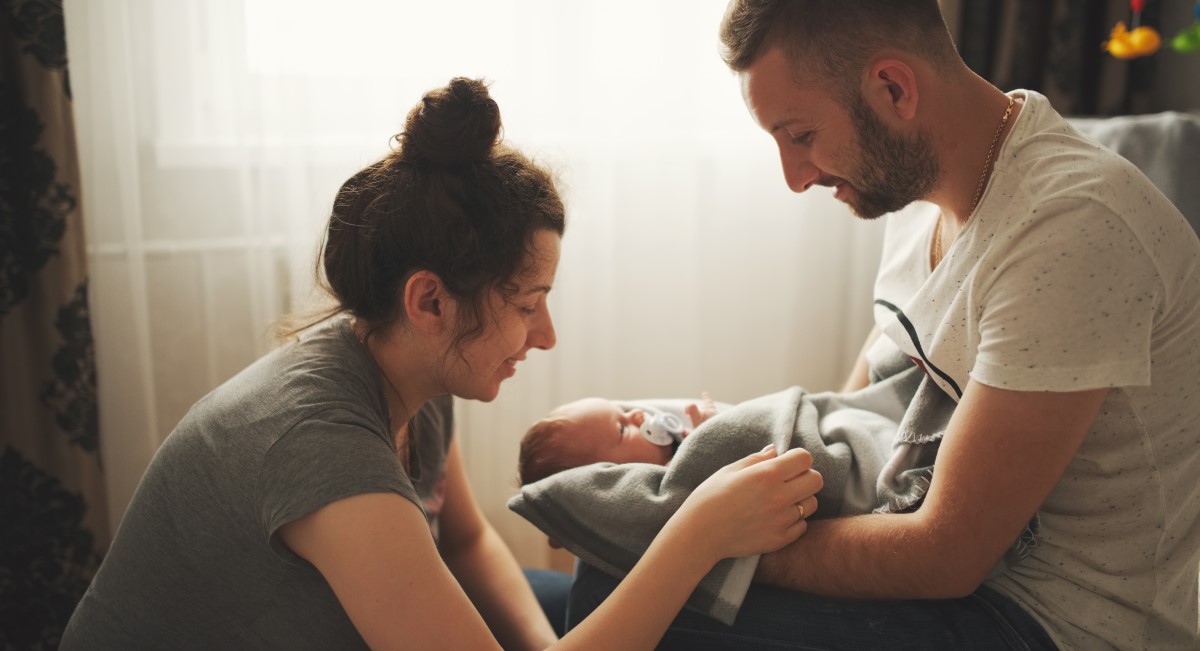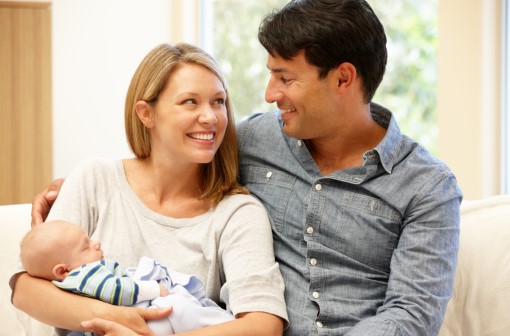“Goals need to be achievable so that we don’t set ourselves up to falter or become overwhelmed if things don’t go to plan.”—Cass Middleton, Clinical and Coaching Psychologist.
Key points
- Goals relating to a baby’s future should be clearly defined, realistic, achievable and flexible.
- When planning for a baby’s future, it’s important to think ahead and put things in place before you need them.
- Setting up a strong support network can help parents manage anxiety about their baby’s future.
As a brand-new parent or parent-to-be, you’ll no doubt have hopes, dreams and plans for your baby’s future. From contemplating what family life will be like and the memories you’ll create together to thinking about the practical stuff, like what school your child will go to or the career they might choose, picturing the possibilities can be exciting. But how do we make those dreams a reality?
Here, Clinical and Coaching Psychologist Cass Middleton and Australian Unity’s National Manager of Estate Planning Anna Hacker share their expert advice on setting goals for your child’s future.

How to set goals for your baby’s future
According to Cass, who practices at The Mind Room and is the mother of two children, when it comes to planning for your baby’s future, your first step should be defining your goals.
“There are going to be a lot of factors that new parents are thinking about, so just get really simple and write down a list of what’s important. Then work out what your priorities are from that and break those down into some achievable steps,” she recommends.
“Get really clear on what your expectations are too,” she adds, advising couples to ensure “these are agreed on by both parties as best as they can.”
While clearly defined goals provide a path towards a sense of purpose and security about the future, it’s essential that you’re not rigid about them.
“I encourage new parents to be very flexible because we can’t predict what’s going to happen when we introduce a new member to the family,” stresses Cass. “These goals need to be achievable so that we don’t set ourselves up to falter or become overwhelmed if things don’t go to plan.”
With that said, Cass believes there are some baby goals parents can aim for with certainty, including setting up a bank account, budgeting for health and child care, and working out how much parental leave they can afford to take.
“In terms of what’s realistic, this is going to depend on the family’s unique characteristics,” she explains.
“For some, it’ll be just to plan those first couple of months with your newborn. Others might look a little further and plan that first year, particularly thinking about care and family support, while others will look ahead to education and be putting names down [for schools].”

Start early and think to the future
While new parents certainly have plenty on their plate, Anna, who also hosts the Australian Unity What happens when I die? podcast, stresses the benefits of thinking ahead when it comes to your newest arrival.
“It’s all about planning, putting things in place before you need them and not just hoping that it’ll all work out,” she says. “Children come with a lot of expense, so educate yourself, understand what those costs are going to be in the future and start looking at the options you have now.”
Specifically, Anna recommends all expectant and new parents make a will and assess their existing life insurance policy (and if you don’t have insurance, it’s worth getting some pronto).
“It’s about getting your estate planning in order, getting a will, enduring powers of attorney and letter of wishes organised, making sure there’s a guardian named as well as an executor or trustee so you know who will be managing the money for your kids,” she advises.
Although she acknowledges that most people probably don’t want to be thinking about their life ending just as they’re bringing a new life into the world, she’s adamant that it’s critical to do so.
“It’s not the nicest topic to think about, but understanding what your financial needs will be if the worst happens is certainly going to take a massive stress off,” she advises.
“That’s exactly why life insurance is important and making sure that what you have suits what your objectives are, both if you pass away and also if you lose capacity and can’t work.”
Anna also suggests those planning for a baby’s future look into Australian Unity’s Lifeplan Education Bond, which can be used to cover a wide range of education-related expenses.
“Paying for education is something we do need to plan for a lot earlier,” she says. “Education bonds are a way of making sure you have the funds available, as well as doing it in a tax-efficient way that helps you.
“You’d need financial advice to make sure education bonds are right for your circumstances but it certainly is a way to work smarter, not harder.”

Self-care is the secret to baby goal success
Setting goals and putting strategies in place to achieve them can help to support our overall sense of wellbeing.
But doing this when you’re expecting requires an extra layer of consideration and a focus on self-care, says Cass.
“It’s an incredibly exciting time but also one of increased vulnerability, so it’s really important to prioritise rest so you feel more able to think ahead,” she explains. “Choose the right time of day to do your planning, when you have the most capacity and a little more energy, maybe after a shower or a coffee.”
Once you’ve got your plans organised, Cass recommends leaving them be and only revisiting them periodically.
“Even just from a personal perspective, becoming a parent seems like an invitation for lifelong worry. So it’s common to find yourself getting unsure and questioning things,” she says. “When it comes to your plans, set a date to check in and see what’s still important; if something’s not important anymore, maybe it can go.
“I think once parents have put a skeletal plan in place, if they find they keep on ruminating and worrying, it can be helpful to give themselves a gentle reminder that they’ve done all they can, they’ve made decisions based on the information available and planned as far as they can for their own circumstances.
“This is going to differ between couples and individuals, so we need to be realistic, not feel pressured, and to feel like things might unfold in their own kind of way.”
Cass says setting up a strong support network can also help parents manage anxiety about their baby’s future—something that’s backed by Australian Unity Wellbeing Index research, developed in partnership with Deakin University, which shows that supportive, caring and meaningful relationships play a critical role in bolstering our wellbeing, particularly during challenging periods of life.
“If you’re having concerns, talking to a partner, a close friend or family member can be helpful,” she says.
“Just saying ‘Hey, I’m overwhelmed thinking about what kind of parent I’m going to be’. If that feeling of persistent overwhelm doesn’t shake or shift, though, it’s important to connect with a professional."

Realise the future is theirs, not yours
When you’re setting goals for your baby’s future it can be easy—and tempting—to start projecting your own desires, ambitions and even unrealised dreams onto them.
And although this is really common, it’s important to remember that your bundle of joy is also their own person, says Cass.
“Have a bit of awareness and separation from self and child. Seeing the child as their own individual can be helpful,” she advises.
“Perhaps these dreams will align with that young person but we need to step back and question whether they do, whether they suit the child, whether they’re actually appropriate or realistic for them.”
The most important plan for your baby’s future
All parents want to do the best they possibly can for their children but, advises Cass, while setting goals, organising our finances and planning our estate are important, there’s one thing we should really prioritise for our baby’s future.
“I just want to reiterate the importance of being flexible; having realistic, achievable goals; setting up a support network around you in preparation for transitioning into parenthood; and just being really kind to yourself,” she says.
“The most important thing when you bring a baby home is being able to love them, connect with them and keep them safe. Really, that’s the key foundation for them becoming healthy adults later in life.”
Disclaimer: Information provided in this article is of a general nature. Australian Unity accepts no responsibility for the accuracy of any of the opinions, advice, representations or information contained in this publication. Readers should rely on their own advice and enquiries in making decisions affecting their own health, wellbeing or interest. Interviewee titles and employer are cited as at the time of interview and may have changed since publication.


